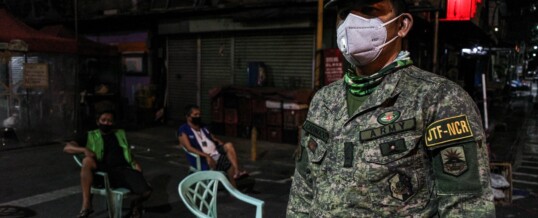
McLeod Group blog by Kirsten Van Houten and Em Mijares, June 1, 2020
Around the world, many governments and other actors are using the cover of COVID-19 to perpetrate human rights abuses. In response, Canada’s Foreign Affairs Minister François-Philippe Champagne stated that “while the need to protect public health is vital, it is imperative to ensure that these measures are not used to undermine the fundamental civil liberties and human rights of all people.”
Since then, the Canadian government has only issued one subsequent statement on promoting international human rights as part of a response to COVID-19, focused on the need to guarantee women’s access to sexual health and reproductive rights and their full participation in decision-making processes No further updates of measures taken to promote human rights through its response to COVID-19 have been provided since then.
Concurrently, the Canadian government announced its lifting of existing restrictions on arm sales to Saudi Arabia, in spite of its commitment to promoting human rights during the pandemic. This contradiction underscores the challenges the government faces when trying to reconcile its trade interests with the promotion of human rights. A similar situation can be found in Canada’s relations with the Philippines.
The government of the Philippines responded to the COVID-19 pandemic by locking down Luzon island and restricting the movements of 57 million people. The military and police are enforcing the quarantine, often using excessive force. Meanwhile, the government has failed to provide adequate testing to the citizens or meaningful financial assistance as livelihoods have been restricted. The police have shut down community kitchens, and arrested or detained relief teams bound for aid distribution in Bulacan, Quezon City and Marikina.
The pandemic has also worsened the existing human rights crisis in the Philippines. Nearly 120,000 people have been arrested for violating lockdown rules, further contributing to the overcrowding of prisons. At 534 percent of their capacity in March 2020, the country’s jails are the most overcrowded in the world. These conditions make physical distancing and isolation of infected detainees impossible, putting those detained in a highly vulnerable position to be infected.
Further, human rights defenders remain vulnerable to arrests and attacks during the lockdown. Activist Jory Porquia, who led relief efforts in Iloilo City, was gunned down on April 30. Forty-two Porquia mourners were arrested on May 1 for trying to hold a funeral procession and lighting candles, including his daughter, a priest and a human rights lawyer. Prior to the pandemic, President Rodrigo Duterte’s regime relied on a process called “red-tagging” to target human rights defenders, accusing individuals and groups of supporting violent rebellion through the New People’s Army. The consequences for being red-tagged include the criminalization of civil society organizations, arrest and even extrajudicial death.
Press freedom has also been limited. For instance, the National Telecommunications Commission ordered the shutdown of a major broadcasting network that previously been slated by President Duterte for closure, an order which violates press freedoms and should be outside of the President’s power. Several individuals had also been arrested after expressing discontent on social media regarding the lack of relief efforts and the government’s handling of the current crisis.
These conditions identify avenues for integrating human rights into the Canadian government’s response to COVID-19 in the Philippines. First, Canada’s actions must not worsen the existing human rights situation. A report in 2018 suggested that Canada had taken steps towards renegotiating a shipment of Bell Helicopters which had previously been cancelled over human rights concerns. Canadian academics are also awaiting a long-delayed access-to-information request on Canadian shipments of military equipment to the Philippines. Any additional exports of this nature would only serve to reinforce the militarized response to the pandemic and further jeopardize the lives of human rights defenders.
Second, Global Affairs Canada needs to fully implement its “Voices at Risk: Canada’s Guidelines of Supporting Human Rights Defenders”. Actions would include Canadian embassy officials visiting incarcerated political prisoners and working with the government of the Philippines to negotiate a release of low-risk political and vulnerable prisoners. They should also hold regular meetings with local journalists to receive updates about press freedoms and raise concerns with their Philippines government counterparts.
Finally, the Canadian government should anticipate that the government of the Philippines will respond strongly to criticisms of its human rights record. This fact should not deter the government from supporting the full implementation of international human rights standards. Canada should also avoid suspending work with human rights partners because they have been red-tagged. Ongoing arrests of and attacks against human rights defenders underscore the urgent need for Canada to continue to provide support for activities of local human rights organizations in the Philippines – and elsewhere around the world.
Kirsten Van Houten is the Global Partnerships Coordinator at KAIROS Canada and has been acting as the co-convenor for the Philippines Group of the Canadian Council for International Co-operation’s Asia-Pacific Working Group. Em Mijares is the Project Coordinator of the Ecumenical Voice for Human Rights and Peace in the Philippines (EcuVoice) human rights and gender rights project. Photo: Mark Z. Saludes, LiCAS News.
